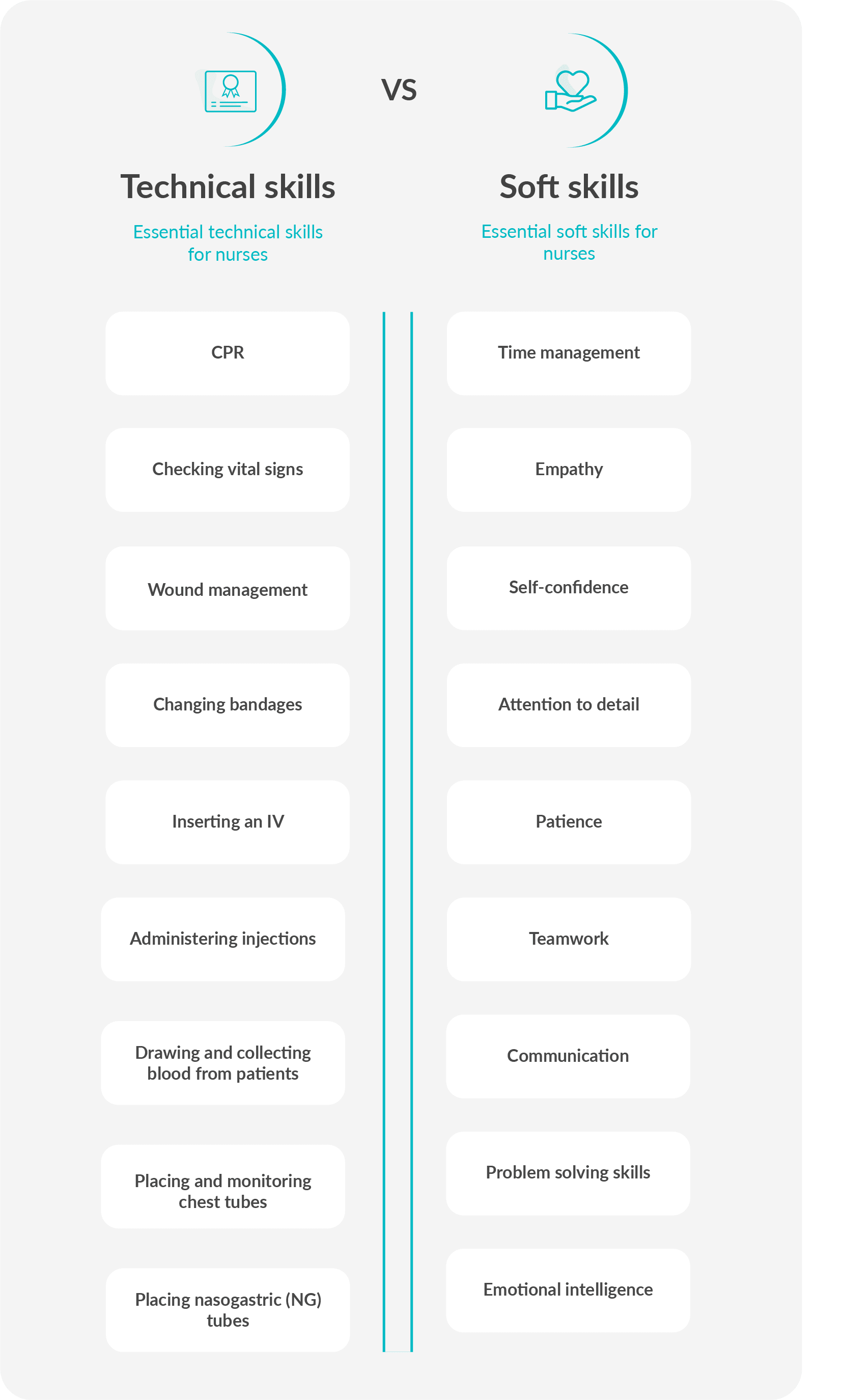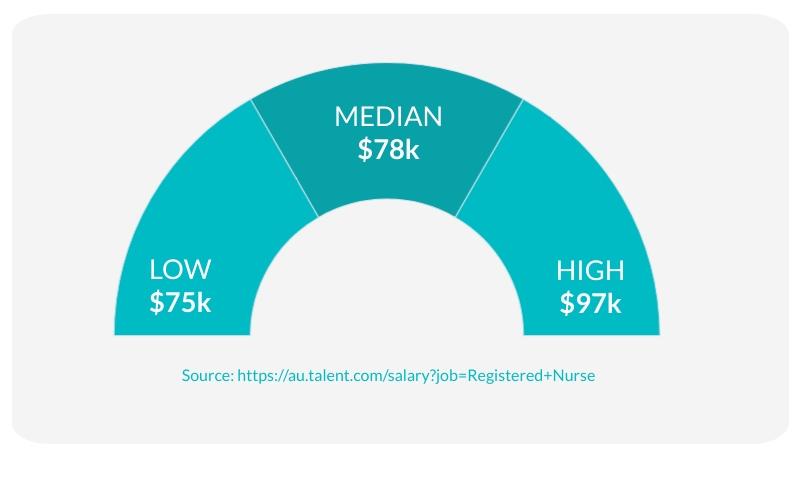Essential Nursing Skills: Everything You Need to Know

Nurses are respected for the job they do, but it’s not an easy role. Nursing requires dedication, skills and training to become such a highly valued member in the healthcare industry. If you’re compassionate and love making a positive impact in people’s lives, nursing could be a fulfilling career for you.
With the healthcare and social assistance industry projected to see employment growth of 14.2% by November 2025, there is no better time to jump into the nursing field. But before diving in, it’s important to be aware of the skill set and qualities of a nurse to ensure the career is right for you.
Technical skills of a nurse vary depending on the type of nurse or field they work in, but soft skills and qualities a nurse needs generally remain the same across the different types of nursing. You may already have these transferable soft skills and just not know it yet.
If you’re considering a career as a nurse but are unsure of what it takes – from what skills you need to what nursing degree you should study – we’ve got you covered.

Meet Joel
Joel Oldfield is a Registered Nurse, specialising in neurology and palliative care. His role is dedicated to looking after neurological and palliative care patients, managing and treating their symptoms.
Nursing is an exceptionally rewarding career for Joel. Since starting as a nurse, he has gained extensive knowledge and learned the skills needed to succeed in his role.
These are Joel’s insights on the skills required to work as a nurse.
Skills of a Nurse

Technical skills
- CPR
- Checking vital signs
- Wound management
- Changing bandages
- Inserting an IV
- Administering injections
- Drawing and collecting blood from patients
- Placing and monitoring chest tubes
- Placing nasogastric (NG) tubes
Soft skills
- Time management
- Empathy
- Self-confidence
- Attention to detail
- Patience
- Teamwork
- Communication skills
- Problem-solving skills
- Emotional intelligence
Soft Skills
There are many soft skills that are transferable and extremely useful to have as a nurse. Each one is equally as important and contributes to the success you can have in the industry.
Time Management
Time management is an essential skill for every nurse. There are many tasks a nurse needs to complete within their shift, including administrative tasks, patient care and cleaning. With proper time management skills, nurses organise, prioritise and complete their duties to a high standard. Without this skill, a nurse can’t look after their patients to the best of their ability.
“You have four patients as the usual load, but sometimes [you have more]. For example, I had eight the other day because we were short-staffed. So, you have to have time management and organisational skills, especially since drugs are due at certain times,” Joel said.
Empathy
“As well as time management, you need to have a level of empathy and compassion. If you don’t have interpersonal skills and empathise with the patient or the family, you’re not really going to look after them very well.”
A nurse must empathise with their patients and their families to understand and share their struggles or pain. Through showing empathy and compassion, a nurse can help to ease their patients’ and families’ pain, and cope with their issues.
Self-confidence and attention to detail
Self-confidence greatly impacts a nurse’s performance. Without confidence, a nurse’s job is a lot more difficult, including administering medication and delivering care efficiently.
“I feel like if I didn’t have any confidence in myself, I wouldn’t do my job very well,” Joel said.
Nurses treat injury and illness in their role, and sometimes it can be life or death. Attention to detail is crucial when working, so they do not make mistakes when it comes to high-risk tasks such as injecting patients.
“[You] definitely [need] attention to detail, especially when you’re performing antiseptic or aseptic techniques and procedures…”
Patience
“People can be annoying — you have to have your patience.”
Nurses need immense levels of patience for everything they do, it allows them to remain calm under pressure and avoid conflict with patients, families or colleagues. Nurses must stay cool, calm, and collected to deliver the best care possible to vulnerable patients.
“You have to have patience because family can be very demanding and patients themselves can be very demanding. When people are sick, they don’t do things very quickly, as well,” Joel said.
Teamwork and communication
Nurses who possess problem-solving skills are naturally in a better position to help their patients. They view problems not as an obstacle or dead end, but as a way to improve their patient’s health.
Nurses may be confronted with unexpected situations sometimes, and need to use adaptability and critical thinking skills when decision-making. By doing this, they care for their patients in a more intentional way.
“Say someone falls over in the bathroom and they’re in an awkward position. There’s no right way to get them up and stop them getting injured…,” Joel said. “So, I need to figure things out sometimes, because there’s no procedure for everything.”
Problem-solving skills
Without teamwork and communication skills, a nurse’s job would be far more difficult than it needs to be. Working as team members and sharing the load makes caring for patients a whole lot easier.
If nurses didn’t work together and use effective communication, they may not find out about vital information or changes to a patient’s method of care. Also, nurses need to communicate with those taking over their shifts and inform them of any changes or important details.
“…sometimes rooms one, two, three and four will have really high care needs patients, and rooms five, six, seven and eight will have really easy patients. When each nurse has four patients and one nurse has four very high care patients, they’re not going to be able to do it all. So you kind of have to share the load a bit,” Joel said.
Emotional intelligence
Emotional intelligence allows nurses to understand their emotions and control their reactions, so they are able to do their job effectively. Nurses can form bonds and relationships with their patients, so if an illness worsens or there is a death, nurses need to keep their composure and emotions in check.
Emotional intelligence is essential for nurses to be conscious of their emotions and detect and recognise those of patients and family members.
“You have to read the room. If people are grieving, they don’t want you to be there. But also sometimes they want answers and they want to know what comes next,” Joel said.
What are the different types of nurses?
Not all nurses do the same job. There are many different types of nurses whose roles involve tasks that are completely different from one position to another. While most nurses generally require the same soft skills to succeed in their career, the hard skills differ depending on the type of nurse.
Different types of nursing careers require different technical skills and have different levels of education and qualifications. Depending on the level of expertise and length of study you’re after, there’s a nursing profession to suit you.
| Job | Entry-level Pay | Median Pay | Senior-level Pay |
|---|---|---|---|
| Enrolled nurse | $60k | $62k | $76k |
| Registered nurse | $75k | $78k | $97k |
| Clinical nurse | $96k | $100k | $118k |
| Midwife | $77k | $82k | $108k |
Enrolled nurse/mothercraft nurse
An enrolled nurse (EN), also known as a mothercraft nurse, is responsible for the following:
Bathing, showering, dressing and helping with personal hygiene.
Helping patients complete their rehabilitation programs.
Monitoring and recording temperature, pulse, blood pressure and blood sugar levels, and reporting any changes.
Assisting with general first aid.
Enrolled nurses cannot work without the supervision of a registered nurse. They can be found in a variety of healthcare settings, including hospitals, aged care, the private health sector and medical clinics.
To become an EN, you need to complete a Diploma of Nursing (HLT54115) at a TAFE or registered training organisation (RTO). The average salary for an enrolled nurse in Australia is $62,166.

Registered nurse
Registered nurses (RN) have more responsibilities than an EN. They not only do practical, hands-on care, but they’re involved in administrative tasks, too.
A registered nurse is responsible for:
Administering medications and monitoring patients for side effects.
Recording and updating patients’ medical information regularly.
Consulting with other healthcare professionals, such as doctors and other nurses, to discuss, plan and implement patient care plans.
Educating family members and patients on treatment and care options or plans.
Providing specialised care (if applicable).
RNs can also specialise in a particular area that interests them, like Joel. There are many areas of specialisation to choose from, such as cardiology, mental health, intensive care or occupational health. You’ll need to complete a Transition to Specialty Practice Program (TSPP) if you’d like to have a specialisation.
To become a RN, you need to complete a Bachelor of Nursing. Alternatively, you can also complete a Master of Nursing (Graduate Entry) if you have already completed a different bachelor’s degree. The average salary for a registered nurse is $78,979.

Clinical nurse
A clinical nurse (CN) is a registered nurse who has completed postgraduate study, often in a specific area, to take on additional duties and responsibilities within their role. They work directly with doctors, specialists and healthcare professionals, and are often the go-to professional for other nurses who need expert advice.
A clinical nurse is responsible for:
Being a role model and having an active role in training less experienced staff.
Managing staff and patients.
Collecting patient information and data, monitoring for changes and evaluating this with doctors and specialists to determine suitable patient care plans.
Administering medication.
Consulting with patient care managers and working with nurses to improve patient safety and care.
To become a CN, you first need to have experience working as a RN. CNs need to have completed postgraduate study, such as a Certificate in Clinical Nursing or a Master of Nursing Science. Clinical nurses make an average salary of $100,599 in Australia.

Midwife
Most midwives are registered nurses with additional training and qualifications to support women during pregnancy and contrive childbirth.
Midwives are responsible for:
Providing support, advice and care to women during pregnancy, childbirth and postpartum.
Conducting and guiding labour, including detecting complications and managing emergency situations if they arise.
Caring for the newborn after birth.
Educating the parents on care for their newborn.
To become a midwife, you need to complete a Bachelor of Midwifery, or a double degree of Nursing/Midwifery. Alternatively, nurses who have already completed a bachelor education can complete a Graduate Diploma of Midwifery, or a Master of Midwifery Practice. A midwife earns an average salary of $82,932 in Australia.

Although nursing work is challenging and requires lots of training and competencies, it’s an extremely rewarding career that makes a positive impact in the world. Dedication and love for the job are what makes a good nurse. If you are passionate about being a nurse, the skill set will follow.
Now that you know what skills it takes to work as a nurse, browse our available nursing courses to find which one’s right for you.


